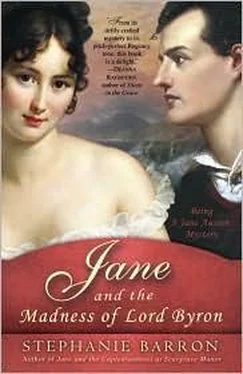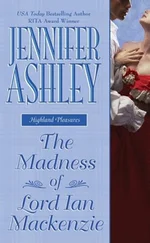Stephanie Barron
Jane and the Madness of Lord Byron
In Memory of Bupsh
1918–2010
Pictures of perfection as you know
make me sick & wicked.—
JANE AUSTEN in a letter to her niece,
Fanny Knight, 23 March 1817
Chapter 1 Summons from London
25 APRIL 1813
SLOANE STREET, LONDON
MR. WORDSWORTH OR SIR WALTER SCOTT SHOULD NEVER struggle, as I do, to describe Spring in Chawton: the delight of slipping on one’s bonnet, in the fresh, new hour before breakfast, and securing about one’s shoulders the faded pelisse of jaconet that has served one so nobly for countless Aprils past; of walking alone into the morning, as birdsong and tugging breezes swell about one’s head; of the catch in one’s throat at the glimpse of a fox, hurrying home to her kits waiting curled and warm in the den beneath the Park’s great oaks. Spring — in all its rains and clinging mud, its sharp green scents fullblown on the nose, and a newborn foal in the pasture below the Great House!
And in this glorious season, too, a splendid change has come upon the little Hampshire village I call my own — for my elder brother, the rich and distinguished Mr. Edward Austen Knight , as he and all his numerous progeny must now stile themselves, having acceded to his benefactor’s surname as well as his estates in Kent and Hampshire — has descended in state upon Chawton Great House, with his full retinue of trusted servants, under-gardeners, grooms, coachmen, and what I am pleased to call Edward’s Harem: a hopeful clutch of motherless daughters, most too young to marry and still at home.
Edward intends to spend the better part of the summer in the antiquated pile that once was let to our dear neighbours, the Middletons, Mr. John Middleton having determined to give up the place when his treaty was run. While the Austen Knights idle away June and July in Hampshire, their principal seat — Godmersham Park, in Kent — will submit to refurbishment, the interiors having grown sadly shabby without Edward’s late wife’s care. It is quite a treat to have one’s relations — and all the elegancies of table, coach, and society — but a stone’s throw from one’s door; and I spun many happy webs for myself that bright April morning, as I walked through the meadows, and listened to the song of a blackbird hidden somewhere in the hedgerow. Edward’s eldest daughter, Fanny, is full twenty years old — and although a trifle subdued for my taste, and possessed of starched notions quite appalling in one so young, she must be adjudged a welcome addition to the Cottage circle, whenever she may venture through the village in search of trifles and laughter. It was possible, I thought, that Martha Lloyd and I between us might be of use to poor dear Fanny, in enlarging her spirit and mind — or at the very least, her capacity for wit. There is nothing so quelling in a young woman, I find, as a want of humour; but much must be forgiven the girl — she was thrust too young into the rôle of Mother, when Elizabeth died. Fanny cannot have been more than fifteen, then; and at twenty, must feel already as though she has lived two lifetimes, in managing her father’s household. She is certain to find Chawton unutterably dull, however; the Assemblies in Alton are not such as she has been used to, in the elegant Kentish circle she frequents. Was there, I wondered, any young man in the neighbourhood capable of engaging her interest?
Considering and discarding the various scions of local families as I walked amidst the dew-laden grass, I was full of pleasurable schemes that dreadful morning. Once Fanny was dismissed as too dear a prize for Alton’s youth, my mind revolved the various attractions of an altogether different cut of gentleman — one Henry Crawford: for I have reached a most delicious point in the writing of my third novel, which is to be called Mansfield Park , when I must decide whether another Fanny (a sober and rather humourless young woman entirely of my own invention, though not quite my niece) is to make the roguish creature the Happiest of Men, or cast him into the Depths of Misery at a single word.
I had turned towards home after a brisk half-hour of exercise and rambling thought; when all at once it was as though a cloud moved swiftly across the sun, and my pleasure in the day was blotted out. The very air felt chill. I stopped short a good thirty paces from the Cottage door, a feeling of deepest dread in my heart — and for why? Only that a handsome chestnut hack was tethered to the post in the lane, one I recognised as my nephew Edward’s mount. Why should a morning call, even one paid so unfashionably before breakfast, have the power to stop my heart?
I ran the final distance to the door.
My brother’s eldest son and heir was standing before the fire, dressed not for hacking about the countryside in buckskins and boots, but for Town; his cravat meticulously tied, shirt points terrifyingly starched; a striped waistcoat trimly buttoned over primrose-coloured pantaloons. An Oxford lad of nearly nineteen, he had stiled himself a Corinthian of the First Stare; and it was this unwonted grandeur, as well as the expression of scared dignity on his young countenance, that informed me my heart had not erred. Disaster was in the air.
“What is it?” I whispered.
Cassandra came to me then, and enfolded me in her arms.
“An Express from Henry, to the Great House,” she said.
“Has she gone?” I faltered. “And none of us aware?”
Edward cleared his throat. “Not quite gone, Aunt. But failing, Uncle Henry says. She is asking for you, I believe. Father says you are to travel up to London as soon as may be — in his chaise — and I am to bear you company.”
“Edward!” I stared at him. “I am sure you should much rather be hunting rabbits on such a fine morning.”
“So I should, ma’am,” he stammered, “but under the circumstances — no exertion too great — should consider it an honour — wish most earnestly that you will accept my escort.” He bowed stiffly, his face flushing with embarrassment. “Not the thing, you know — lady travelling entirely alone. Might very well be offered an intolerable insult. Besides, m’father commands it.”
Edward , whom I cared for and cajoled so many years since, when his own mother died — to be offering me escort! I understood, then, the punctiliousness of his manner and dress. My nephew was representing his House — and paying off a debt of gratitude. I should be churlish to protest further; and besides, the hour was already advancing.
I uttered not another word, but dashed upstairs to throw what swift provision I could into a carpet bag. My beloved Eliza, Comtesse de Feuillide, wife of Mr. Henry Austen of Sloane Street — was dying . It seemed far too bitter a truth for Spring.
WHEN DID SHE FIRST APPREHEND HER MORTAL SICKNESS, I wondered for the thousandth time as the chaise jolted and swayed over the Hog’s-back an hour later? [1] The Hog’s-back is a narrow ridge that runs between Farnham and Guildford; the road traveled by the Austens on their journey to London ran along the summit and offered excellent views of some six counties. — Editor’s note.
Was it so early as my descent on London some two years since, for the proofing of the typeset pages of Sense and Sensibility ? She suffered then, as I recall, from a trifling cold, and took to her bed on the strength of it; but surely that was a deliberate indulgence, to avoid the necessity of attending Divine Service of a particular Sunday?
Eliza was never very fond of Divine Service; she had seen too much of Sin, to place her faith in either repentance or redemption; and she felt certain that the clergy were the very last sort of men to lecture their brethren — indeed, she declared the whole pious enterprise an essay in hypocrisy. Eliza preferred to live her life and leave her neighbours to live theirs, without the benefit of unwanted advice or inspection; and on the whole, I confess I admire her philosophy. There is a great deal of disinterested benevolence in it.
Читать дальше












